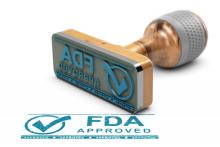User login
. This is the human interleukin-12 and IL-23 antagonist’s fourth indication since it was first approved by the FDA in 2009.
The approval is based on findings from the phase 3 UNIFI clinical trial, which achieved its primary endpoint of clinical remission over the course of both induction and maintenance. The 8-week induction study saw 19% of patients achieve clinical remission and 58% demonstrating clinical response; at the 1 year mark, after 44 weeks of maintenance therapy, 43% of patients were in clinical remission without steroids. The trial also assessed a novel histologic-endoscopic mucosal improvement endpoint that examined cellular improvement through both histologic examination and images observed during colonoscopy; 17% of treated patients achieved this endpoint at week 8, and 44% had by 1 year.
“The FDA approval of Stelara for [ulcerative colitis] represents an exciting milestone, offering patients a new option that has demonstrated improvement of the histology and endoscopic appearance of the intestinal lining, while also offering patients the potential for response and remission without the need for steroids,” said William J. Sandborn, MD, chief of the division of gastroenterology and professor of medicine at University of California, San Diego, and a study investigator.
Because of ustekinumab’s effects on the immune system, it may increase the risk of serious infection; as such, patients and health care professionals should discuss any signs of infection before initiation and continue discussions afterward. There are also concerns about risks of cancers, serious allergic reactions, and lung inflammation.
Full prescribing information is available on the Janssen website, as is the full press release regarding the approval
. This is the human interleukin-12 and IL-23 antagonist’s fourth indication since it was first approved by the FDA in 2009.
The approval is based on findings from the phase 3 UNIFI clinical trial, which achieved its primary endpoint of clinical remission over the course of both induction and maintenance. The 8-week induction study saw 19% of patients achieve clinical remission and 58% demonstrating clinical response; at the 1 year mark, after 44 weeks of maintenance therapy, 43% of patients were in clinical remission without steroids. The trial also assessed a novel histologic-endoscopic mucosal improvement endpoint that examined cellular improvement through both histologic examination and images observed during colonoscopy; 17% of treated patients achieved this endpoint at week 8, and 44% had by 1 year.
“The FDA approval of Stelara for [ulcerative colitis] represents an exciting milestone, offering patients a new option that has demonstrated improvement of the histology and endoscopic appearance of the intestinal lining, while also offering patients the potential for response and remission without the need for steroids,” said William J. Sandborn, MD, chief of the division of gastroenterology and professor of medicine at University of California, San Diego, and a study investigator.
Because of ustekinumab’s effects on the immune system, it may increase the risk of serious infection; as such, patients and health care professionals should discuss any signs of infection before initiation and continue discussions afterward. There are also concerns about risks of cancers, serious allergic reactions, and lung inflammation.
Full prescribing information is available on the Janssen website, as is the full press release regarding the approval
. This is the human interleukin-12 and IL-23 antagonist’s fourth indication since it was first approved by the FDA in 2009.
The approval is based on findings from the phase 3 UNIFI clinical trial, which achieved its primary endpoint of clinical remission over the course of both induction and maintenance. The 8-week induction study saw 19% of patients achieve clinical remission and 58% demonstrating clinical response; at the 1 year mark, after 44 weeks of maintenance therapy, 43% of patients were in clinical remission without steroids. The trial also assessed a novel histologic-endoscopic mucosal improvement endpoint that examined cellular improvement through both histologic examination and images observed during colonoscopy; 17% of treated patients achieved this endpoint at week 8, and 44% had by 1 year.
“The FDA approval of Stelara for [ulcerative colitis] represents an exciting milestone, offering patients a new option that has demonstrated improvement of the histology and endoscopic appearance of the intestinal lining, while also offering patients the potential for response and remission without the need for steroids,” said William J. Sandborn, MD, chief of the division of gastroenterology and professor of medicine at University of California, San Diego, and a study investigator.
Because of ustekinumab’s effects on the immune system, it may increase the risk of serious infection; as such, patients and health care professionals should discuss any signs of infection before initiation and continue discussions afterward. There are also concerns about risks of cancers, serious allergic reactions, and lung inflammation.
Full prescribing information is available on the Janssen website, as is the full press release regarding the approval

